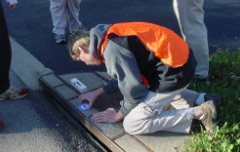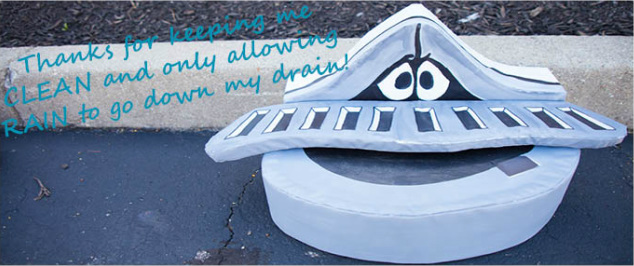What can I do?

Did you know that every single person in Hamilton County contributes to the quality of county waterways? That’s right; the actions we take as individual citizens contribute to the health of the streams, rivers, and ponds that cross our county’s landscape.
If this is news to you, then you probably don’t know that there are things you can look for in your community, and steps you can take in your own back yard that will help protect Hamilton County waterways for years to come.
For example, everyday activities such as working on your lawn, washing your car, and sprucing up the exterior of your home can cause storm water pollution and can negatively impact the quality of our waterways – if we don’t take proper precautions.
The average homeowner applies seven times more chemicals to their lawn than a farmer does per acre. Excessive application of fertilizers and pesticides on our lawns can be washed away by sprinklers and rain, ending up in storm drains that empty into the nearest stream or waterway.
Many of us try to save money by changing our automobile or lawnmower’s oil, antifreeze and other fluids. Do you know how to properly dispose of these used products? Most of us know that these materials should never be dumped into a storm drain or waterway, but we may still unwittingly contribute to storm water pollution if we change these fluids in our driveways. Rain water or hoses may wash excess into the stream and down the storm drain. Leaky vehicles that are parked outside can have the same negative effect.
There are many things we should and should not do as residents of Hamilton County to protect the health of our waterways. Simple things like removing pet waste and grass clippings from our yard and making sure our septic systems are functioning properly can all have a big impact on our streams and rivers.
What you can do to Help
Actions you SHOULD take:
Actions you should AVOID:
Reporting Pollution
Now that you’ve decided to become a good environmental citizen, what should you do if you witness someone else polluting a storm drain or other waterway? Call the Hamilton County Storm Water Hotline at (513) 946-7000. If you see any of the following occurring in your neighborhood, please call the hotline:
If this is news to you, then you probably don’t know that there are things you can look for in your community, and steps you can take in your own back yard that will help protect Hamilton County waterways for years to come.
For example, everyday activities such as working on your lawn, washing your car, and sprucing up the exterior of your home can cause storm water pollution and can negatively impact the quality of our waterways – if we don’t take proper precautions.
The average homeowner applies seven times more chemicals to their lawn than a farmer does per acre. Excessive application of fertilizers and pesticides on our lawns can be washed away by sprinklers and rain, ending up in storm drains that empty into the nearest stream or waterway.
Many of us try to save money by changing our automobile or lawnmower’s oil, antifreeze and other fluids. Do you know how to properly dispose of these used products? Most of us know that these materials should never be dumped into a storm drain or waterway, but we may still unwittingly contribute to storm water pollution if we change these fluids in our driveways. Rain water or hoses may wash excess into the stream and down the storm drain. Leaky vehicles that are parked outside can have the same negative effect.
There are many things we should and should not do as residents of Hamilton County to protect the health of our waterways. Simple things like removing pet waste and grass clippings from our yard and making sure our septic systems are functioning properly can all have a big impact on our streams and rivers.
What you can do to Help
Actions you SHOULD take:
- Dispose of pool and hot tub water and backwash properly: use our guide.
- Cover and seed all bare soil and preserve stream side vegetation – sediment is the #1 water pollutant by volume!
- Compost yard waste, sweep up grass clippings and tree trimmings from pavement. Hamilton County residents can drop off their yard trimmings for free at specified drop-off locations. Click here for more information
- Clean up pet waste from your yard and when you walk your dog. Flush it or send it with your household garbage to the landfill.
- Maintain your household sewage treatment system. For maintenance and inspection information, contact (513) 946-7800 or Click here for more information
- Store oil and other automobile supplies properly – containers should be tightly sealed. Click here for more information
- Take old paint, pesticides, automotive fluids, and batteries to a hazardous waste handling facility. Hamilton County residents can drop off household hazardous waste for free at specified drop-off locations. Click here for more information
- Wash your car at a commercial car wash or on a non-paved surface to avoid draining into the storm sewer.
- Keep storm water on your property through use of rain gardens and rain barrels.
- Pick up litter whenever and wherever you see it.
Actions you should AVOID:
- Dumping excess soil, lawn clippings, leaves, or tree trimmings along stream banks, over hillsides or into the street.
- Dumping anything into storm drains. Report anyone who dumps chemicals into storm drains by calling the Storm Water Hotline, (513) 946-7000. Storm water that enters these drains generally flows untreated into local waterways.
- Overuse fertilizers and pesticides. You can test your soil to determine the amount needed and when to apply. Kits are available from Hamilton County Soil & Water Conservation District, (513) 772-7645.
Reporting Pollution
Now that you’ve decided to become a good environmental citizen, what should you do if you witness someone else polluting a storm drain or other waterway? Call the Hamilton County Storm Water Hotline at (513) 946-7000. If you see any of the following occurring in your neighborhood, please call the hotline:
- Dumping in storm drains
- Dumping in streams, rivers or other waterways
- Excessive soil erosion or runoff around development, construction sites or agriculture fields.
- Polluted storm water can lead to fish kills, destruction of wildlife habitat, loss of aesthetic value, impaired recreational areas and contaminated drinking water resources. You can help keep Hamilton County waterways clean and clear by reporting and preventing possible sources of storm water pollution. Call the Hamilton County Storm Water Hotline at (513) 946-7000.




